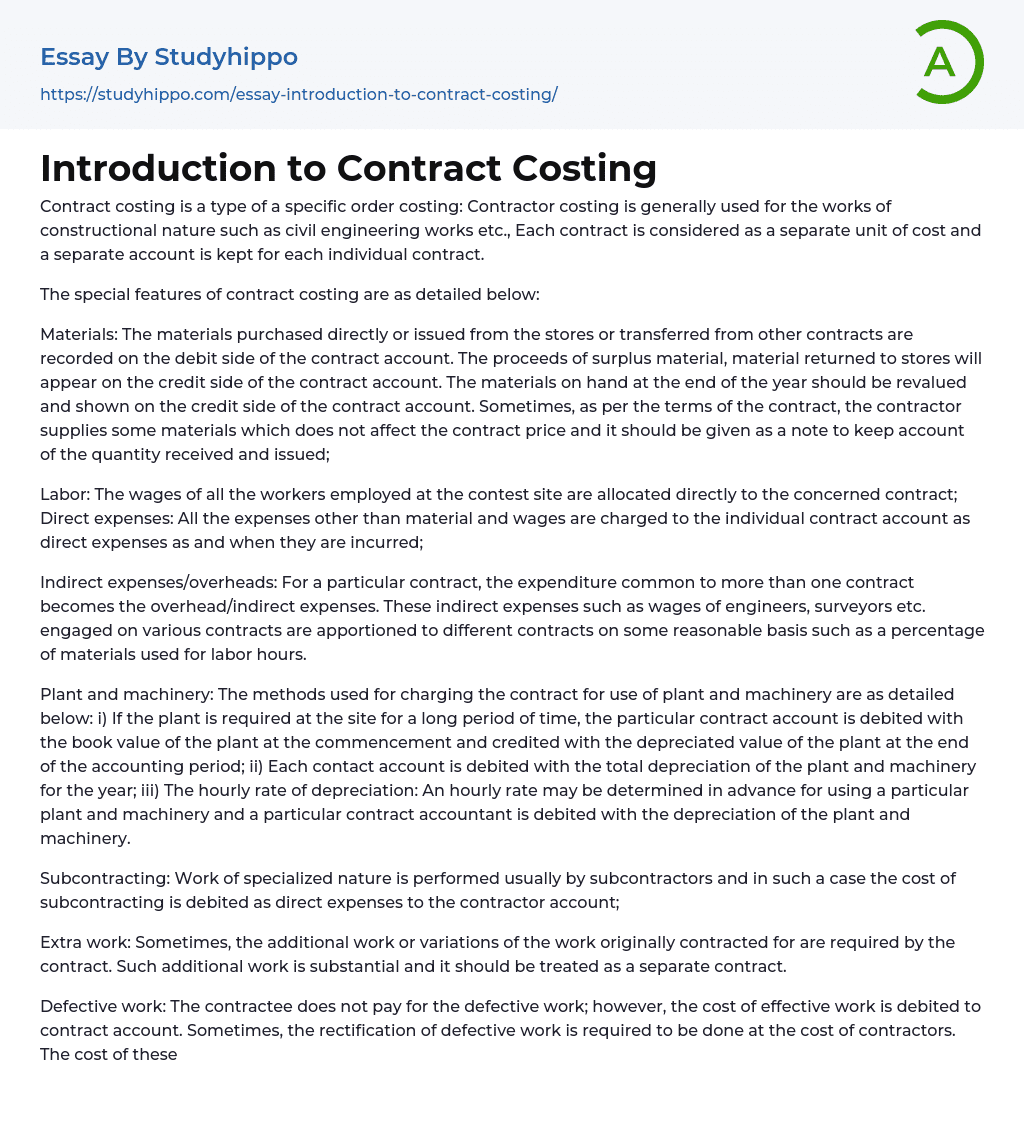Contract costing is a form of specific order costing, often utilized for construction projects like civil engineering works. In this method, each contract is treated as an independent unit of cost, and a separate account is maintained for each individual contract.
The characteristics of contract costing are outlined below:
The materials for a contract are accounted for by recording direct purchases, store issues, and transfers on the debit side of the contract account. Surplus material proceeds and material returned to stores are recorded on the credit side of the contract account. At the end of the year, the value of materials on hand should be revalued and shown on the credit side of the contract account. Occasionally, the contractor may supply materials that do not impact the contract price. These materia
...ls should be noted to keep track of the quantity received and issued.
The labor wages for all workers at the contest site are assigned to the respective contract, while any expenses excluding materials and wages are charged directly to the contract account as direct expenses as they occur.
Indirect expenses or overheads refer to the common expenses incurred for multiple contracts. This includes costs like wages of engineers and surveyors who work on different projects. These expenses are allocated to individual contracts based on a reasonable basis, such as a percentage of materials used or labor hours.
The charging methods for the use of plant and machinery in contracts are outlined below:
- If the plant is needed at the site for a long period, the contract account is debited with the
initial book value of the plant and credited with its depreciated value at the end of the accounting period.
Subcontracting involves hiring specialized subcontractors to perform specific tasks, and the cost of subcontracting is directly recorded as an expenditure in the contractor's account.
The contract may necessitate additional work, either in the form of extra work or alterations to the originally agreed-upon work. If this added work is substantial, it should be regarded as a distinct contract.
The contractee is not responsible for paying for defective work. Instead, the cost of effective work is deducted from the contract account. Sometimes, contractors have to fix defective work at their own expense, and this cost is also deducted separately from the contract account.
The cost plus contract is a contract type where the value is calculated by adding a specified profit to the actual manufacturing or service cost. This kind of contract is beneficial when accurately determining the execution cost is challenging, like in cases with incomplete work details or unstable conditions. The cost plus contract safeguards manufacturers from risks tied to market price fluctuations for materials, labor, and other services while also guaranteeing that the buyer pays a fair price.
- Agreement essays
- Business Law essays
- Common Law essays
- Community Policing essays
- Constitution essays
- Consumer Protection essays
- Contract essays
- Contract Law essays
- Copyright Infringement essays
- Court essays
- Crime essays
- Criminal Law essays
- Employment Law essays
- Family Law essays
- Injustice essays
- Judge essays
- Jury essays
- Justice essays
- Lawsuit essays
- Lawyer essays
- Marijuana Legalization essays
- Ownership essays
- Police essays
- Property essays
- Protection essays
- Security essays
- Tort Law essays
- Treaty essays
- United States Constitution essays
- War on Drugs essays
- Asset essays
- Capital market essays
- Day Trading essays
- Depreciation essays
- Discounted Cash Flow essays
- Foreign Direct Investment essays
- Funds essays
- Futures Trading essays
- Internal Rate Of Return essays
- Million essays
- Revenue essays
- Career essays
- Career Path essays
- Homeless essays
- Labour Economics essays
- Occupational Safety And Health essays
- Pension essays
- Profession essays
- Salary essays
- Strike Action essays




